|
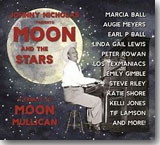 Moon
Mullican was nicknamed “King of the Hillbilly
Piano Players.” The singer/songwriter/pianist
and his band, The Showboys, became one of the
most popular groups in Texas and Louisiana in
the ’40s and ’50s, playing a mix of country
music, Western swing, Cajun, and blues. Mullican
himself was influenced not just by country and
swing artists like Jimmie Rodgers and Bob Wills,
but also by blues artists like Bessie Smith,
Leroy Carr, and Blind Lemon Jefferson, and was
introduced to the blues by a black sharecropper
that worked for his family. Moon
Mullican was nicknamed “King of the Hillbilly
Piano Players.” The singer/songwriter/pianist
and his band, The Showboys, became one of the
most popular groups in Texas and Louisiana in
the ’40s and ’50s, playing a mix of country
music, Western swing, Cajun, and blues. Mullican
himself was influenced not just by country and
swing artists like Jimmie Rodgers and Bob Wills,
but also by blues artists like Bessie Smith,
Leroy Carr, and Blind Lemon Jefferson, and was
introduced to the blues by a black sharecropper
that worked for his family.
Mullican influenced many artists in a number of
genres, including former band member Jim Reeves,
Hank Williams, Hank Snow, Bill Haley, Elvis
Presley, Jerry Lee Lewis and Asleep at the
Wheel. The legendary Texas roots and blues
artist, Johnny Nicholas, a former
frontman for Asleep at the Wheel, was also
influenced by Mullican and is a big fan.
Nicholas recently released a two-volume tribute
set to Mullican, Moon and the Stars: A
Tribute to Moon Mullican (Valcour Records),
a fantastic set with a huge list of guest
artists of multiple genres equally influenced by
the gifted piano man.
Earl
P. Ball starts Volume 1 in rollicking fashion
with “Good Deal Lucille,” the 81-year-old
bringing tremendous energy to this tune. Kelli
Jones and Tif Lamson duet on the gorgeous “When
Love Dies,” and Los Texamaniacs rip through the
jaunty “Moonshine Polka.” Bluegrass veteran
Peter Rowan sings the somber “I’m Waiting For
Ships That Never Come In,” with Danny Levin on
piano and Greg Piccolo on saxophone.
Nicholas makes his first appearance, on vocals
and Resonator, for the bluesy “Big Big City,”
and plays guitar behind Linda Gail Lewis’
(sister to Jerry Lee) piano and vocals on the
country swinger “I’ll Sail My Ship Alone,”
before taking the mic again (and playing piano)
on “You Don’t Have To Be A Baby To Cry.”
Volume 1 concludes with Katie Shore playing
fiddle and singing on the upbeat “There’s A
Little Bit Of Heaven,” Kelli Jones returning
with the wistful “So Long”, and Nicholas teaming
with Danny Levin on piano for the lively “Make
Friends.”
The
second volume begins with Marcia Ball on piano
and vocals for the upbeat “Good Times Gonna Roll
Again,” Emily Gimble (backed by Nicholas on
harmonica) with the forlorn country tune
“Leaving You With A Worried Mind,” and Shore,
who returns for the toe-tapper “What Have I
Done.” Lamson and Nicholas share vocals (with
Kelli Jones on acoustic guitar) on “I Was Sorta
Wondering,” and Nicholas swings, Western style,
on “All I Need Is You.”
Augie Meyers, founding member of the Sir Douglas
Quintet and Texas Tornados, tackles the swinging
blues “Pipeliner Blues.” Rowan returns on vocals
for the serene “Downstream,” while Mamou Playboy
front man Steve Riley sings and plays accordion
on the zydeco-flavored “Seven Nights To Rock,”
supported by Lamson, Shore, and Nicholas on
“gang vocals.” Lamson and Jones team up again
for the mournful “Bottom Of The Glass,” and
Nicholas concludes Volume 2 with “Don’t Take My
Picture Down.”
The
core band for the set features Shore
(fiddle/harmony vocals), Floyd Domino (piano),
Rusty Blake (steel/electric guitars), Scrappy
Judd Newcomb (electric/acoustic guitars), Chris
Maresh (bass) and Lamson (drums). Other
contributors include Los Texamaniacs (Max Baca –
bajo sexto, Josh Baca – accordion, Noel
Hernandez – bass, Chris Rivera – drums), Trey
Boudreaux (bass), Danny Levin (piano/fiddle),
Joel Savoy (acoustic and electric
guitar/percussion), Alex Goodrich (sousaphone),
and Mike Archer (bass).
Moon and the Stars: A Tribute to Moon Mullican
is a fantastic set of tunes paying tribute to an
artist who influenced a host of musicians in a
variety of musical styles. Whether you like
blues, country, Cajun, zydeco, swing, or just
music in general, this is an absolutely
wonderful ride.
--- Graham Clarke
 Dyer
Davis gets the New Year off to a rousing
start with Dog Bites Back (Wildroots
Records), a blistering set that mixes blues,
rock and soul from one of the most exciting new
voices in all three genres. The Florida-based
singer/guitarist contributed a powerful vocal on
“The Bad Seed” on the WildRoots’ WildRoots
Sessions Volume 2 release, and this 13-song
set of tunes, 12 originals written or co-written
by Davis, Stephen Dees, Victor Wainwright, Billy
Chapin or Stan Lynch, shows that performance was
no flash in the pan. Dyer
Davis gets the New Year off to a rousing
start with Dog Bites Back (Wildroots
Records), a blistering set that mixes blues,
rock and soul from one of the most exciting new
voices in all three genres. The Florida-based
singer/guitarist contributed a powerful vocal on
“The Bad Seed” on the WildRoots’ WildRoots
Sessions Volume 2 release, and this 13-song
set of tunes, 12 originals written or co-written
by Davis, Stephen Dees, Victor Wainwright, Billy
Chapin or Stan Lynch, shows that performance was
no flash in the pan.
Davis is joined by a host of musicians,
including drummers David Weatherspoon, Lynch,
and Billy Dean, bassist Jacob Barone, Mark
Earley on baritone sax, Doug Woolverton on
trumpet, Joe Young, and keyboardist Dave Mikeal.
Also joining are Wainwright on keyboards for
three tracks and vocals for one, Walter Andrews
on dobro, WildRoots head man Dees and Chapin on
multiple instruments, and Patricia Ann Dees on
tenor sax, flute, and background vocals.
The
album’s lone cover, an energetic read of Jeff
Beck and Rod Stewart’s “Let Me Love You,” comes
roaring out of the gate, setting the bar
extremely high for the remainder of the record.
Fortunately, Davis is more than up to the
challenge, rolling into the powerful shuffle
“Walk Away My Blues,” co-written with
Wainwright, the moody rocker “Water Into Wine,”
and the soulful, horn-charged “Cryin’ Shame,”
which shows the singer is equally comfortable in
the soul/R&B department.
The
horns are also present for the gripping blues
rocker “Train Wreck” and “Lifting Up My Soul,”
another solid soul burner.
“Long Way To Go” features Wainwright on co-lead
vocals with Davis and searing slide guitar work
from Chapin, complementing Davis’ own stellar
fretwork and Wainwright’s keyboards. “Wind Is
Gonna Change” is a gentle acoustic blues penned
by Davis that features Andrews’ dobro playing,
while the mid-tempo title track is a another
strong blues rocker, and “Angel Get the Blues”
is a piano-driven ballad where Davis’ tender
side is on full display.
“These Walls” reintroduces the horns and the
soul vein, with Davis really shining on vocals
as well as guitar. The last two tracks, “Don’t
Tell My Mother” and “AKA,” lean toward the roots
and Americana genre, and are both quite
effective.
Dyer
Davis grew up listening to blues rock, the
southern and the British varieties, and soul
music. His sound incorporates all of those
styles and does it tremendously well. Fans of
those styles of music are strongly encouraged to
check out Dog Bites Back and the stunning
singer/guitarist responsible for it.
---
Graham Clarke
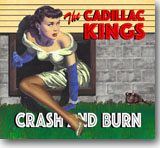 The
Cadillac Kings were formed in 2000,
consisting of former members of the bands of
Otis Grand, Paul Lamb, Big Joe Louis, and The
Poorboys. One of the hottest bands in the UK
since their inception, the Cadillac Kings
currently consists of guitarist Mal Barclay,
keyboardist Tim Penn, bassist Paul Cuff, drummer
Jason Reay, and founding
member/singer/songwriter/harp player/slide
guitarist Mike Thomas. The
Cadillac Kings were formed in 2000,
consisting of former members of the bands of
Otis Grand, Paul Lamb, Big Joe Louis, and The
Poorboys. One of the hottest bands in the UK
since their inception, the Cadillac Kings
currently consists of guitarist Mal Barclay,
keyboardist Tim Penn, bassist Paul Cuff, drummer
Jason Reay, and founding
member/singer/songwriter/harp player/slide
guitarist Mike Thomas.
Crash and Burn (33 Records) is their sixth
album release, and the 14 tracks (12 written or
co-written by Thomas) deftly mix blues and R&B
in contemporary and traditional styles.
The
blues-rock shuffle “Doubtin’ Thomas” gets the
album off to a great start, quickly jumping into
the old school rock ‘n’ roller “Betty Lou Just
Broke Outa Jail,” and “Bona Fide” has a lot of
swagger. The rousing “Cadillac Boogie” should
get listeners inspired to shake a tail feather,
and the swinging “It Ain’t Smart” is an amusing
cautionary tale. “Don’t Fix It” and the sinister
“Havana Mama” both have a funky swamp blues
feel.
“Farmer John” is a sturdy vintage rocker and the
title track is a churning blues rocker with a
slippery slide guitar break from Thomas. “When
One Door Closes” has an R&B feel with cool
Crescent City-styled keyboards from Penn. The
band has a good time with Memphis Slim’s slow
blues “Beer Drinkin’ Woman,” and the rollicking,
humorous “Too Much Stuff” finds Thomas lamenting
the online ordering craze sweeping the world.
The
swampy, Gulf Coast-flavored “Six Feet From A
Rat” leads into the album closer, “Zombie Walk,”
a all-too-true narrative about the mobile phone
obsession played to Magic Sam’s “Sam’s Boogie”
instrumental.
The
Cadillac Kings have something to offer any
blues, R&B, or vintage rock ‘n’ roll fan.
Crash and Burn is a great set of original
tunes in a variety of styles from a superb band
that knows their way around the block.
--- Graham Clarke
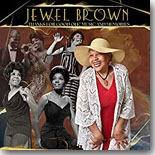 The
legendary Houston-based soul and jazz singer
Jewel Brown returns with Thanks For Good
Ole’ Music and Memories (Nic Allen Music
Federation), her first album in eight years.
Unlike previous efforts, Ms. Brown wrote seven
of the ten tracks, collaborating with Nic Allen,
who was longtime musical director to the late
Joe Sample. The
legendary Houston-based soul and jazz singer
Jewel Brown returns with Thanks For Good
Ole’ Music and Memories (Nic Allen Music
Federation), her first album in eight years.
Unlike previous efforts, Ms. Brown wrote seven
of the ten tracks, collaborating with Nic Allen,
who was longtime musical director to the late
Joe Sample.
At
85, her voice remains strong and soulful , as
she deftly moves through this diverse set of
blues, jazz, and R&B that lean traditional, but
give a nod to contemporary sounds, as well.
The
opener, “Jerry,” is a song that has appeared a
few times in Brown’s repertoire, most recently
on her 2013 album with Milton Hopkins, and it’s
always a pleasure to hear. This version is funky
and jazzy with a Latin flair, featuring
contributions from RADS Krusaders and Live! In
The Clutch. “Pain And Glory” is a brief a
capella number where Brown gives her testimony
of faith backed by a male chorus, and “Why Did
You Do That” retains that Latin flavor, mixing
jazz and R&B, and her interplay with the male
vocals works very well.
“Which Way Is Up” was a disco hit in 1977 for
the Motown group Stargard. Brown’s version is a
little grittier and more downhome, but still
retains that funky edge. The feisty “Nitches And
Glitches” finds her frustrated with her lover’s
antics and ready to put him in the street, and
“Flatitude” is a playful jazz number. “I Love
Sunshine, Even More Rainy Nights” is a slow
urban blues burner, with more interplay between
Brown and the male vocalists.
“Song of the Dreamer” was written by Brown’s
ex-husband Eddie “Tex” Curtis and her version is
sung superbly, as the music blends R&B and blues
with a contemporary jazz feel. The relaxed,
laid-back “On The Road” features her best vocal
on the album, as she looks back at her days
traveling the world as a performer, including
her days touring with Louis Armstrong. The male
vocalists (Allen, Dashon Brown, and Zedekiah
Franklin) provide excellent backing once again
on this track. The album closes with the
playful, swinging blues of “How Did It Go.”
At
85, Jewel Brown sounds like she’s up for much
more singing and performing. Now that she’s
writing her own songs, she may have a few more
albums in her, and that’s not a bad thing at all
for blues and jazz fans.
--- Graham Clarke
 A
half century in, guitarist Paul Filipowicz
is still making mighty music. The Chicago blues
veteran, who played with Mighty Joe Young, Lefty
Dizz, Hound Dog Taylor, and Luther Allison
before starting his own band, offers up his 11th
album, Pier 43 (Big Jake Records), a
downhome, gutbucket set of blues like they used
to play ‘em. This nine-song set of mostly
originals feature Filipowicz (lead
vocals/guitars), Steve Lewis (bass), Brian
“Tito” Howard (drums), and Big Al Dorn
(harmonica). A
half century in, guitarist Paul Filipowicz
is still making mighty music. The Chicago blues
veteran, who played with Mighty Joe Young, Lefty
Dizz, Hound Dog Taylor, and Luther Allison
before starting his own band, offers up his 11th
album, Pier 43 (Big Jake Records), a
downhome, gutbucket set of blues like they used
to play ‘em. This nine-song set of mostly
originals feature Filipowicz (lead
vocals/guitars), Steve Lewis (bass), Brian
“Tito” Howard (drums), and Big Al Dorn
(harmonica).
Also
included on the album are two bonus tracks
recorded at a WIBA live radio concert in
November of 1979, featuring Clyde Stubblefield
(drums), “Fat” Richard Drake (sax), Gary Zappa
(bass), Will “Smokey” Logg (guitar) and John
Chimes (piano).
Opening the disc is “Old Time Superstition,” a
greasy, slide-driven trip through the Louisiana
swamp. “Angel Face” is a old-fashioned Windy
City shuffle that will surely satisfy, and the
instrumental title track is a splendid,
slow-burning guitar fest. “When I Get To Town”
is a rumbling Mississippi Hill Country track
that will shake you to your soul and the tasty
instrumental “Spit Shine” is driven by a funky
rhumba beat.
“Hip
Shake” is a crunchy boogie blues rocker with a
relentless groove, and Filipowicz’s cover of
Copperpenny’s “Poor Man’s Throne” (famously
covered by Bobby “Blue” Bland in 1977) is first
rate. “Hundinger” is a sturdy blues rocker, and
the blues standard “Cut You Loose” is a crowd
pleaser as well. The first part of the album
wraps up with a raucous instrumental segment
called “Texas Out.”
The
bonus tracks at the end include covers of the
Meters’ “Ain’t No Use,” and Coffin and
Goldberg’s “Use My Imagination,” a hit for Glady
Knighth & the Pips back in the day. Both of
these tracks are deliciously funky. Could they
be any other way with that backing band??!!!
Fans will certainly be glad that Filipowicz
found room for these two track on what is
already a most excellent album.
--- Graham Clarke
 During
the pandemic, work slowed to a crawl for most
musicians, at least the touring and performing
in local clubs. Five guys from Wichita Falls,
Texas who were a part of the local blues scene
decided to take advantage of the down time and
make an album. Hammond B3 player Joe Splawn, who
spearheaded this project, had played with the
Turner Blues Band, which appeared in the I.B.C.
three times, coming in fourth the last time they
appeared. The other members of the group, dubbed
Lone Star Mojo, include guitarists Mark
Snyder and Scott Biggs, bassist Tim Maloney, and
drummer Barry Sloan also have deep roots in the
local scene. During
the pandemic, work slowed to a crawl for most
musicians, at least the touring and performing
in local clubs. Five guys from Wichita Falls,
Texas who were a part of the local blues scene
decided to take advantage of the down time and
make an album. Hammond B3 player Joe Splawn, who
spearheaded this project, had played with the
Turner Blues Band, which appeared in the I.B.C.
three times, coming in fourth the last time they
appeared. The other members of the group, dubbed
Lone Star Mojo, include guitarists Mark
Snyder and Scott Biggs, bassist Tim Maloney, and
drummer Barry Sloan also have deep roots in the
local scene.
The
group’s debut album, Rough Around The Edges,
features 15 original songs written by Snyder,
Splawn, and Biggs, and it’s a tough set of blues
rockers like they play them in Texas. Opening
with the funky blues, “This Time,” the band
quickly rolls headlong into the rocking shuffle
“Victim of the Blues,” the smoldering “Texas
Drought,” and “Big as a Bus,” an amusing blues
with a funk edge. “Low Down Dirty Side of the
Blues” slows the pace down a bit before livening
things up again with the fast-paced shuffle
“Heart Broke, No Good, Nasty Loving Woman.”
“All
You Have Left is the Blues” is a soulful slow
burner, “Not in the Groove” is a strong,
R&B-flavored number with a hint of rock in the
mix, and “Crazy About That Woman” is a pleasing
blues rocker. Same goes for the sturdy “Texas
Sky,” while “Gold Digger” is a gritty blues with
a nasty guitar riff.
“I
Pity The Fool” is not the Bobby “Blue” Bland
classic, but a greasy, somewhat offbeat southern
rocker, and the sizzling “Fine and Nasty”
continues along that same line, with a bit more
of a Texas vibe. “Humpty Dumpty Blues” is a slow
blues with the emphasis on Splawn’s nimble B3,
and the album wraps with the funky “Toppish
Groove.”
Splawn takes the mic for six tunes, Snyder
handles five songs, Biggs sings four, and
Maloney does one vocal. The musicianship
throughout is first rate. It’s obvious that
these guys have played together off and on in
various groups since the mid ’80s, and their
songwriting and composing skills are impressive.
Rough Around The Edges is one of the few
good things to emerge from the pandemic and,
hopefully, Lone Star Mojo will make it happen
again under more ideal conditions.
--- Graham Clarke
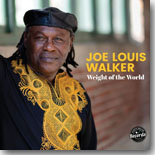
Joe Louis Walker has been one the more
consistently solid blues performers during a career that spans
nearly 40 years, always keeping his music fresh sounding, with
nearly 30 albums to his credit. Walker's latest, Weight of
the World (Forty Below Records), shows that this man's still
got it, with ten solid cuts showing a variety of blues styles.
Walker and producer Eric Corne shared songwriting credits, with
the latter also showing up on guitar and background vocals.
The title cut gets the show underway, a soulful
number with a Caribbean feel to it, as Walker sings about
dealing with the state of the world today but in an optimistic
vein. "Is it a Matter of Time" brings out a big sound of brassy
soul in a mid-tempo shuffle beat. Changing the mood completely
is the very quiet, ethereal "Hello, it's the Blues," with most
of the accompaniment coming from Scott Milici's piano as
well as strings arranged by Eric Gorfain, while background
singers give it a gospel feel. .
Walker takes us to New Orleans for the second
line sound on "Waking Up the Dead," with Corne's snaky slide
guitar giving it that swampy feel. Back to a big soul sound on
"Don't Walk Out That Door, with plenty of horns. This one just
plain reeks of classic Memphis soul, and is the highlight of the
album. "COunt Your Chickens" is an up-tempo blues that again
features guitar with plenty of funky effects from Corne.
The up-tempo stomper "Blue Mirror" gives Walker
the chance to showcase his inner Chuck Berry, with Milici
pounding away on the 88's. Plenty of staccato guitar picking
from Walker here. "Root Down" is a mid-tempo shuffle with
harmonica and keyboards giving this one a different sound from
other songs on the album. "Bed of Roses" is an ominous, snaky
blues that wrings the pain from both Walker's voice and his
guitar. His woman left him a letter and he is begging her not to
give up on him. This song grew on me the more I heard it.
Closing out the album is a jazzy, mid-tempo
shuffle. "You Got Me Whipped," with Milici's organ and electric
piano work and Walker's resonant guitar solo putting this one
over the top. It's a nice pleasant ending to a very fine album.
Just one more in Walker's impressive discography. Recommended.
--- Bill Mitchell
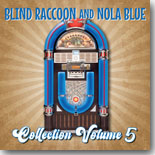 Good
things always happen when notable blues publicist Blind Raccoon
and independent label Nola Blue team up for their periodic
collections of songs from various artists, and Blind Raccoon
And Nola Blue Collection, Volume Five is no exception. This
double-album is released on Blue Heart Records, so we hear
contributions from their artists, too. 30 cuts of a variety of
musical styles. It's hard to please everyone when you're doing
this kind of diverse project, but there is plenty for every
blues fans to enjoy, regardless of individual tastes. Good
things always happen when notable blues publicist Blind Raccoon
and independent label Nola Blue team up for their periodic
collections of songs from various artists, and Blind Raccoon
And Nola Blue Collection, Volume Five is no exception. This
double-album is released on Blue Heart Records, so we hear
contributions from their artists, too. 30 cuts of a variety of
musical styles. It's hard to please everyone when you're doing
this kind of diverse project, but there is plenty for every
blues fans to enjoy, regardless of individual tastes.
The cut that absolutely blew me away is the soul
number "Maybe You Will Someday," from New York artists Robert
Hill and singer S. JĀ. It's good. Really, really good, and I
can't wait until this group releases a full albums. When that
comes out, S. JĀ may just turn out to be my favorite singer on
the current scene. From listening to this one cut, S. JĀ's
vocals remind me of what I heard from Ivy Ford, who was last
year's discovery.
Other cuts on Disc One that hit me include "I'd
Do It For You" (Teresa James), "Time Brings About A Change"
(legendary pianist Floyd Dixon), "Savin' Up For Your Love"
(great soul from Carol Sylvan and The Uptown Horns), "Hey Nola"
(The Maple Blues Band, "Jefferson Way" (Stacy Jones), "Come On
People" (The Gayle Harrod Band), and "Dissent" (Tiffany
Pollock).
Jumping right into Disc Two, the highlight here
is "My Baby's Gone" by the always outstanding John Németh. It's
a live cut, with Németh blowing away on the harmonica on this
up-tempo stomper. Other standouts include "Haven't Seen My Baby"
(Anthony Geraci), "My Baby Came Back" (Rochelle & The
Sidewinders), "Blues Without Borders" (Debbie Bond), a soulful
gospel version of John Lennon's "Imagine" (Frank Bey), and "Born
In This Time" (Benny Turner, with another dose of
gospel-influenced blues).
There's lots more here, and it's a good
introduction to artists that we may have never heard before. I'm
most thankful for turning me on to Robert Hill & S. JĀ, as well
as giving an unreleased number by both Teresa James and John
Németh. Also, Frank Bey's extended version of "Imagine" is worth
the price of admission. Check it out and hopefully you'll find
your new favorites.
--- Bill Mitchell
|